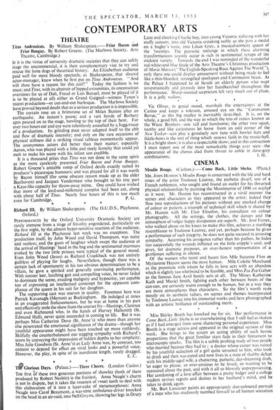THE first Of these two generous portions of showbiz (both
of them produced by Robert Nesbitt) is the fruitiest. Anna Neagle's charm is norm n dispute, but it takes the sweetest of sweet teeth to deal with this elaboration of it into a layer-cake of metamorphoses: Anna Neagle into Carol Beaumont, a war-time ambulance-driver knocked on the head in an air-raid, into Nell Gwynn, showing her legs in Drury Lane and checking Charlie boy, into young Victoria waltzing with her stuffy consort, into old Victoria croaking nobly as she pins a medal on a bugler's tunic, into Lilian Grey, a musical-comedy queen of the 'twenties. The patriotic mélange in which these alarming transformations yeastily occur is rich in sentimental syrups of the stickiest variety. Towards the end I was reminded of the wonderful red-white-and-blue finale of the Arts Theatre's Christmas production of Maria Marren ("The English-Speaking Race Against The World"), only there one could display amusement without being made to feel like a thin-blooded, scroogified spoilsport and Communist beast. At the Palace I happened to sit beside an elderly person who wept uniestrainedly and joyously into her handkerchief throughout the performance. Sharp-snouted scepticism felt very much out of place. It is a jolly wallow.
Vic Oliver, in genial mood, marshals the entertainers at the Casino and keeps a tolerant, amused eye on the "Coronation Revue," as this big medley is inevitably desci ibed. It is, on the whole, a good bill, and the way in which the trio of zanies known as the Wiere Brothers—one tall and handsome; the other two squat, toothy and like caricatures let loose from an odd corner of the New Yorker—can play a genuinely new tune with bowler hats and fiddle-bows is the sort of thing which renews faith in the music-hall. It is a bright show; it is also a respectable show; and in this connection I must report one of the most remarkable things ever seen—the appearance of the chorus clad from throat to ankle in dove-grey


































 Previous page
Previous page